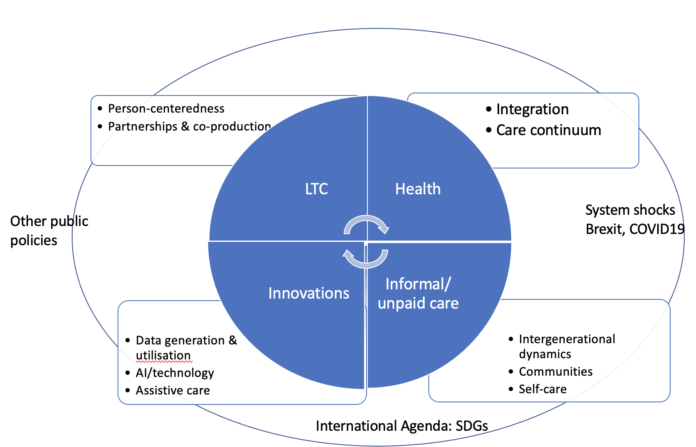Global ageing is a phenomenon that created considerable opportunities as well as significant challenges. Longevity and increases in healthy years generate a range of societal and individual benefits. However, not all extra years of life are spent in good health, thus placing increased demands on care ecosystems encompassing formal and informal health and care services and support mechanisms. Furthermore, the dynamics of population ageing itself entail changes in the population structures, such as the availability of working-age groups as well as the family unit itself, thus posing challenges to the availability and ability of the different actors within the care ecosystems to play their part in meeting the escalating demands. Thinking globally, the fastest transformations in ageing structures are currently taking place in low- and middle-income countries (LMICs).
Many LMICs will experience such transformations within as little as 20 years compared to over a hundred years in some European countries such as France and England. The World Health Organisation estimates that by 2050, 80 per cent of the world older people will be living in LMICs, calling for an urgent reassessment and development of existing and new health and care policies to encompass formal/informal and individual/state support mechanisms. In this seminar, I provide an overview of global ageing followed by an interpretation of the care ecosystems drawing examples from high-income and LMI countries.
In this presentation, Professor Hussein explores the dynamic relationship between formal and informal care spheres as two vital interactive components of an overall ecosystem. Some of these roles are based on assumed preferences and availability of informal support and are guided by fiscal and infrastructure challenges, among other factors. I will discuss the increased policy narratives in Europe of the importance of informal networks such as ‘intergenerational support’, ‘care communities’, individual self-support as complements, and potentially substitutes to more formal LTC services.
She constructs and compares these remerging interests to current LTC support in LMICs, using the Middle East as a regional example, which relies almost solely on these informal support mechanisms. These spheres of formal and informal care are viewed with different lenses within the policy landscape yet can connect or disconnect from their assumed roles and ability to achieve the desired outcomes. Such roles also exist within a framework of shifting responsibilities across substitution and complementarity across various actors: the state, community, family and the individual. Professor Hussein argues for developing a dynamic care ecosystem approach acknowledging inequalities and gender bias when assuming roles to various actors yet is adaptive to changes across the life course and external factors, such as technology and migration.
SHussein-PHPSeminar-May21Founder and Director
Shereen Husseinis a Health and Social Care Policy professor at the London School of Hygiene and Tropical Medicine (LSHTM), United Kingdom.
Shereen Founded the MENARAH Network in 2019, through an initial grant from the Global Challenge Research Fund, UKRI. She is a medical demographer with expertise in ageing, family dynamics, migration and long-term care systems. Shereen regularly collaborates with the United Nations, the World Health Organisation and the World Bank in policy and research focused on ageing in the Middle East and North Africa Region.
Shereen received her undergraduate degree in statistics and a postgraduate degree in computer science at Cairo University. She completed an MSc in medical demography at the London School of Hygiene and a PhD in quantitative demography and population studies at the London School of Economics and Political Science, United Kingdom.



